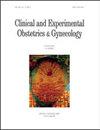多囊卵巢综合征患者血清五肽-3水平的临床意义评价
IF 0.6
4区 医学
Q4 OBSTETRICS & GYNECOLOGY
引用次数: 0
摘要
背景:多囊卵巢综合征(PCOS)通常与胰岛素抵抗(IR)、高胰岛素血症和血脂异常有关,它们在内皮功能障碍的发展中发挥作用,并促进心血管疾病的早期发病。本研究的目的是评估在多囊卵巢综合征患者中五唑菌素-3水平的临床重要性。方法:根据2003年鹿特丹标准诊断为多囊卵巢综合征的45名女性患者和42名健康女性纳入研究。所有被研究的女性都在月经周期的3天和5天内接受了测试。首先使用耻骨上法对每位患者进行超声评估。采用酶联免疫吸附测定法测定血清PTX-3、内皮素1(ET-1)、血管细胞粘附分子1(VCAM-1)、细胞间粘附分子-1(ICAM-1)和一氧化氮水平。结果:患者组的五甲状腺素-3(PTX-3)水平显著低于对照组(p<0.05)。多毛症组的PTX-3水平显著高于非多毛症组(p<0.05)。患者组的IR稳态模型评估(HOMA-IR)水平显著高于对照组(p<0.01)PTX-3与HbA1c水平呈负相关。PTX-3测试在区分患者和非患者方面的准确率中等,曲线下面积值为0.634。结论:在PCOS患者的随访过程中,可能观察到血清PTX-3水平的下降与多毛症和IR有关。本文章由计算机程序翻译,如有差异,请以英文原文为准。
Evaluation of the clinical significance of serum pentraxin-3 levels in patients with polycystic ovary syndrome
Background: Polycystic ovary syndrome (PCOS) is commonly associated with insulin resistance (IR), hyperinsulinemia, and dyslipidemia, which play a role in the development of endothelial dysfunction and promote the early onset of cardiovascular diseases. The aim of this study was to evaluate the clinical importance of pentraxin-3 levels in PCOS patients. Methods: Forty-five female patients diagnosed with PCOS according to the 2003 Rotterdam criteria and 42 healthy women were included in the study. All women studied were tested within 3 and 5 days of their menstrual cycle. Ultrasonographic evaluation of each patient was first conducted using the suprapubic method. Serum PTX-3, endothelin 1 (ET-1), vascular cell adhesion molecule 1 (VCAM-1), intercellular adhesion molecule 1 (ICAM-1), and nitric oxide levels were measured using the enzyme-linked immunosorbent assay method. Results: Pentraxine-3 (PTX-3) levels in the patient group were significantly lower than those in the control group (p < 0.05). PTX-3 levels in the group with hirsutism were significantly higher than those in the nonhirsutism group (p < 0.05). Homeostatic model assessment for IR (HOMA-IR) levels in the patient group were significantly higher than those in the control group (p < 0.01). A weak negative correlation was found between PTX-3 and HbA1c levels. The accuracy rate of the PTX-3 test in distinguishing patients and nonpatients was moderate with a 0.634 area-under-the-curve value. Conclusions: During the follow-up of patients with PCOS, a decrease in serum PTX-3 levels associated with hirsutism and IR may be observed.
求助全文
通过发布文献求助,成功后即可免费获取论文全文。
去求助
来源期刊
CiteScore
0.50
自引率
0.00%
发文量
241
审稿时长
1 months
期刊介绍:
CEOG is an international, peer-reviewed, open access journal. CEOG covers all aspects of Obstetrics and Gynecology, including obstetrics, prenatal diagnosis, maternal-fetal medicine, perinatology, general gynecology, gynecologic oncology, uro-gynecology, reproductive medicine, infertility, reproductive endocrinology, sexual medicine. All submissions of cutting-edge advances of medical research in the area of women''s health worldwide are encouraged.

 求助内容:
求助内容: 应助结果提醒方式:
应助结果提醒方式:


